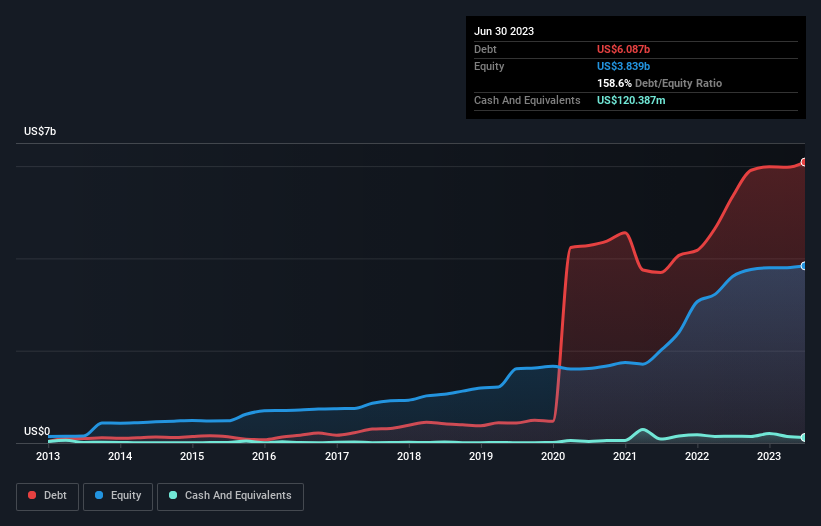Warren Buffett famously said, 'Volatility is far from synonymous with risk.' So it seems the smart money knows that debt - which is usually involved in bankruptcies - is a very important factor, when you assess how risky a company is. As with many other companies Tricon Residential Inc. (TSE:TCN) makes use of debt. But the real question is whether this debt is making the company risky.
When Is Debt A Problem?
Generally speaking, debt only becomes a real problem when a company can't easily pay it off, either by raising capital or with its own cash flow. If things get really bad, the lenders can take control of the business. While that is not too common, we often do see indebted companies permanently diluting shareholders because lenders force them to raise capital at a distressed price. Of course, plenty of companies use debt to fund growth, without any negative consequences. When we examine debt levels, we first consider both cash and debt levels, together.
See our latest analysis for Tricon Residential
What Is Tricon Residential's Debt?
The image below, which you can click on for greater detail, shows that at June 2023 Tricon Residential had debt of US$6.09b, up from US$5.35b in one year. Net debt is about the same, since the it doesn't have much cash.

How Healthy Is Tricon Residential's Balance Sheet?
According to the last reported balance sheet, Tricon Residential had liabilities of US$1.05b due within 12 months, and liabilities of US$8.05b due beyond 12 months. On the other hand, it had cash of US$120.4m and US$25.3m worth of receivables due within a year. So its liabilities total US$8.95b more than the combination of its cash and short-term receivables.
This deficit casts a shadow over the US$1.93b company, like a colossus towering over mere mortals. So we'd watch its balance sheet closely, without a doubt. After all, Tricon Residential would likely require a major re-capitalisation if it had to pay its creditors today.
In order to size up a company's debt relative to its earnings, we calculate its net debt divided by its earnings before interest, tax, depreciation, and amortization (EBITDA) and its earnings before interest and tax (EBIT) divided by its interest expense (its interest cover). Thus we consider debt relative to earnings both with and without depreciation and amortization expenses.
Tricon Residential shareholders face the double whammy of a high net debt to EBITDA ratio (11.5), and fairly weak interest coverage, since EBIT is just 1.8 times the interest expense. The debt burden here is substantial. The silver lining is that Tricon Residential grew its EBIT by 130% last year, which nourishing like the idealism of youth. If that earnings trend continues it will make its debt load much more manageable in the future. There's no doubt that we learn most about debt from the balance sheet. But ultimately the future profitability of the business will decide if Tricon Residential can strengthen its balance sheet over time. So if you're focused on the future you can check out this free report showing analyst profit forecasts.
Finally, a business needs free cash flow to pay off debt; accounting profits just don't cut it. So it's worth checking how much of that EBIT is backed by free cash flow. Looking at the most recent three years, Tricon Residential recorded free cash flow of 44% of its EBIT, which is weaker than we'd expect. That's not great, when it comes to paying down debt.
Our View
On the face of it, Tricon Residential's net debt to EBITDA left us tentative about the stock, and its level of total liabilities was no more enticing than the one empty restaurant on the busiest night of the year. But at least it's pretty decent at growing its EBIT; that's encouraging. Overall, we think it's fair to say that Tricon Residential has enough debt that there are some real risks around the balance sheet. If everything goes well that may pay off but the downside of this debt is a greater risk of permanent losses. When analysing debt levels, the balance sheet is the obvious place to start. But ultimately, every company can contain risks that exist outside of the balance sheet. Case in point: We've spotted 5 warning signs for Tricon Residential you should be aware of, and 2 of them are a bit concerning.
If you're interested in investing in businesses that can grow profits without the burden of debt, then check out this free list of growing businesses that have net cash on the balance sheet.
Valuation is complex, but we're here to simplify it.
Discover if Tricon Residential might be undervalued or overvalued with our detailed analysis, featuring fair value estimates, potential risks, dividends, insider trades, and its financial condition.
Access Free AnalysisHave feedback on this article? Concerned about the content? Get in touch with us directly. Alternatively, email editorial-team (at) simplywallst.com.
This article by Simply Wall St is general in nature. We provide commentary based on historical data and analyst forecasts only using an unbiased methodology and our articles are not intended to be financial advice. It does not constitute a recommendation to buy or sell any stock, and does not take account of your objectives, or your financial situation. We aim to bring you long-term focused analysis driven by fundamental data. Note that our analysis may not factor in the latest price-sensitive company announcements or qualitative material. Simply Wall St has no position in any stocks mentioned.
About TSX:TCN
Tricon Residential
Tricon Residential Inc. (NYSE: TCN, TSX: TCN) is an owner, operator and developer of a growing portfolio of approximately 38,000 single-family rental homes in the U.S.
Average dividend payer and slightly overvalued.
Market Insights
Community Narratives




